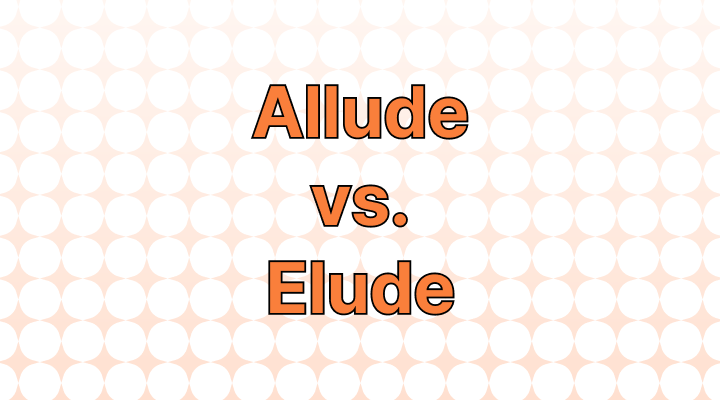Allude means to make an indirect or casual reference to something without explicitly mentioning it. Elude means to escape from or avoid something or someone skillfully or cleverly.
When to use Allude?
Allude is a verb that means to make a reference to something indirectly or to hint at it without explicitly mentioning it. When you want to suggest or refer to something without stating it directly, you allude to it. This word is commonly used in both formal and informal writing.
Example sentence
- In her speech, the politician alluded to the economic challenges facing the country without explicitly mentioning them.
When to use elude?
Elude is also a verb, but it means to escape or avoid something skillfully, often by being difficult to capture, comprehend, or achieve. You use elude when you want to describe the act of evading or escaping from something, whether it's a physical pursuit, a problem, or comprehension.
Example sentence
- Despite their best efforts, the detectives couldn't elude the criminal's cunning tactics.
Allude and elude may sound alike, but they have distinct meanings and applications in English. Allude involves indirect references or hints, while elude relates to escaping or avoiding something skillfully.
By understanding the differences in grammar and meaning between these two words, you can enhance the clarity and precision of your writing. So, next time you're writing or speaking, you won't let these homophones elude your grasp of proper usage.
Practice Questions
- She didn't want to directly mention her disappointment, so she decided to elude/allude to it in her speech.
- The magician's tricks were so skillful that they seemed to elude/allude the laws of physics.
- In his essay, the writer decided to elude/allude to the historical context without providing explicit details.
- Despite all efforts to capture it, the elusive butterfly continued to elude/allude their grasp.
- The politician carefully avoided mentioning the controversial topic but managed to elude/allude to it subtly.
- The clever fox always managed to elude/allude the traps set by the hunters.
- The teacher encouraged the students to elude/allude to relevant examples in their essays to support their arguments.
- The athlete's speed and agility allowed her to elude/allude her opponents on the track.
- The comedian's jokes often elude/allude to pop culture references that left the audience laughing.
If you still are unsure about which to use, try out Engramwhere you can submit your English sentences to get immediate feedback and suggestions based on how native English speakers write.

Answers
- allude
- elude
- allude
- elude
- allude
- elude
- allude
- elude
- allude
Reference:














